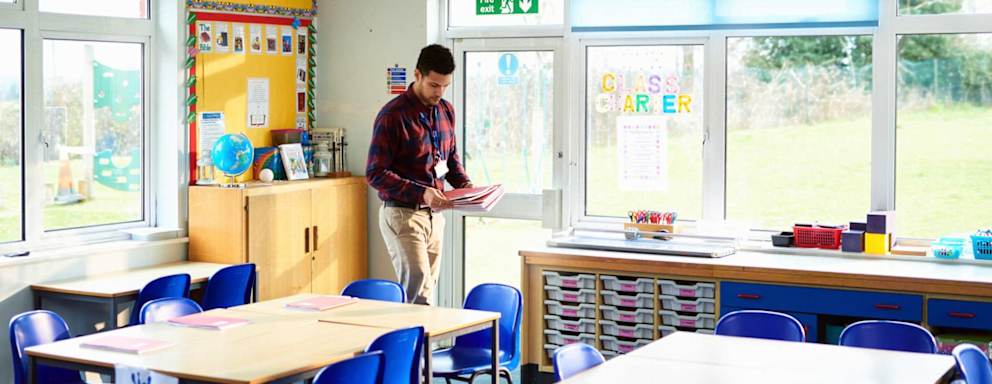N.C. Community College Program Takes Teacher Licensure Local
 Credit: 10'000 Hours / DigitalVision / Getty Images
Credit: 10'000 Hours / DigitalVision / Getty Images- The Cultivating Carolina Classrooms (CCC) initiative is an educator preparation program that costs teachers around $2,500 total to earn licensure.
- According to the North Carolina Department of Public Instruction, about 5,800 of 90,638 North Carolina teachers are seeking licensure.
- CCC operates through local community colleges, allowing teachers to earn their licensure in their local communities.
- CCC is expanding from its pilot program at 10 colleges in 2023-24 to 27 colleges for the 2025-26 academic year.
Teachers in North Carolina who need a teaching license can likely find an educator preparation program (EPP) at a community college near them.
North Carolina has 58 community colleges serving its 100 counties, and the new Cultivating Carolina Classrooms (CCC) program is offered at 21 of these colleges. Starting in the next academic year, the program will expand to six more schools.
The CCC program is designed for current teachers to earn licensure over two years.
Dr. Mary Olvera, state director of teacher education, public services, and Perkins special populations, told BestColleges the initiative began in the 2023-24 school year at 10 colleges. Its goal was to support the teacher pipeline after the community college administration saw teacher vacancy statistics and how people went through the alternative licensure route.
Learning and Working in Your Community
According to the North Carolina Department of Public Instruction (NCDPI), 6.4% (approximately. 5,800) of the 90,638 teachers in the state are unlicensed and seeking licensure. To gain licensure, educators need to complete student-teaching hours and must take certification tests — including the edTPA, which tests their teaching skills.
Olvera said what makes CCC different from other EPPs is the opportunity for students to work in their local schools and complete residency programs in/near their communities.
Since the North Carolina Community College System is the third largest in the nation, most state residents live within 30 minutes of a community college. Olvera said CCC is a grow your own
teacher model that prioritizes hiring and retaining local educators instead of having them seek employment outside their community.
Olvera said Central Piedmont Community College has the largest class of CCC students. The elementary education residency program has 47 enrolled students and 57 applicants, Jennifer Perkins, Central Piedmont EPP director, program chair, and associate professor, told BestColleges. However, it started with just four students last fall.
Perkins that licensure sets a strong foundation for teachers and prepares them academically, emotionally, and socially through various classroom methodologies and techniques — something that a bachelor’s degree outside of education won’t give.
Students at Central Piedmont pay approximately $2,500 total for the entire program, which comes to about $400-$800 a semester if they take 1-2 classes.
Students also don’t need to buy any textbooks — all resources are open. However, all eligible students can complete a Free Application for Federal Student Aid (FAFSA) form to determine their eligibility for financial aid and college scholarships to bring costs down further.
BestColleges found similar costs to Central Piedmont at several colleges including Davidson-Davie, Wake Tech, and Stanly Community College. All project the program costs to be less than $2,500.
I tell my teacher prep students who start off at the community college before earning their bachelor’s degree that this is the best route for a teacher, cost-wise and in a supportive academic environment,
Perkins said. For our residency students, some are still paying off their student loans and simply cannot afford to go into more debt.
Perkins said that her students feel supported through courses, test prep, edTPA prep, and in the classroom.
As educators, we know there is a foundation to learning that is much like a foundation of a house,
Perkins told BestColleges.
That foundation should be solid, so we can build and build on that foundation for years to come. Our program provides the learning instruction to help these classroom teachers know more about how we build that solid foundation for elementary school students, how we teach children, and why we teach them the way we do.
Central Piedmont counsels students at the beginning of the program to determine the most optimal timeline for licensure based on their schedule and family life.
In addition to instructors with years of experience, the college’s residency coach supports students in and out of the classroom with observations, feedback, and guidance through the licensure process.
All students also attend a meeting one night a week, an exclusive feature to Central Piedmont. Here, they can share classroom experiences and critically problem-solve issues. Perkins believes the class meeting has contributed to the program’s success.
I am very passionate about our program and what the state has done to decrease the teacher shortage and attrition rates,
Perkins told BestColleges. We are here to support the program 100% and make it the best choice for licensure in the state.
“In my one-on-one meetings with every student who starts the program, I tell them, Your success is our success. This program cannot flourish without you achieving your goal to be a licensed teacher in N.C.